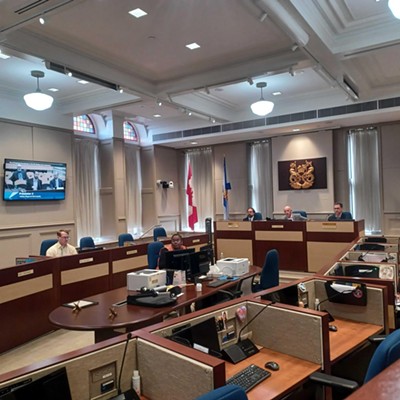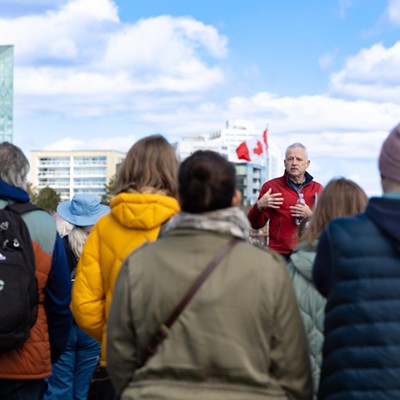Being a sports fan of any team is often an unrequited love affair. For most sports fans, the odds of your favourite team winning are vanishingly small. For the next few years the best odds are in women’s hockey; as the league starts out with an original six. So the odds of seeing your favourite team win a Professional Women’s Hockey League championship are 1 in 6. Halifax soccer fans who follow the Wanderers enjoy slightly worse odds of a 1 in 8 chance of seeing their team win the Canadian Premier League. From there it only gets worse. For example, the odds of a National Hockey League team winning the Stanley Cup start at 1 in 32. But that is a fairly simplistic explanation of odds because there’s a lot more at play. For example, any Toronto hockey fan knows, it’s been 57 years since the last Stanley Cup, not 32.
In order to get better odds, teams are often willing to try just about anything to win. Every now and again, when faced with terrible odds, some enterprising person gets an idea that is so crazy that it just might work. Before talking about what this looks like in Halifax’s budget, it may be important to understand what happened in Philadelphia in the early 2010s. Sam Hinkie came into the Philadelphia 76ers organization with a very good understanding of stats and the rules of the game. Unlike other teams who try to mimic successful strategies, or find undervalued players (aka Moneyball), Hinkie decided to game the rules that governed the National Basketball Association's player draft. Like most other North American sports the NBA is a little bit socialist. If you are willing to be a very bad team, you are rewarded with a higher chance of getting a good draft pick. So Hinkie decided to put a terrible team on the court, for years, to get some generational talents. 76ers fans were asked to trust that being forced to watch the worst team in the NBA for a few years, would result in a championship team anchored by generational talents, like Joel Embiid and Ben Simmons. Fans were asked repeatedly to keep the faith and “trust the process” while being forced to watch the worst team in the league, week in, week out as Embiid and Simmons were sidelined by prolonged injuries as soon as they joined the team. Trust in Hinkie—and in his unorthodox process—has more or less paid off for 76ers fans (one night in Toronto notwithstanding). Although Hinkie himself was forced out of his position by the powers that be in the NBA. Turns out having a team that plays like trash on purpose to try and eek out an advantage is bad for the league as a whole.
Can we trust in Halifax’s new process?
There is no draft in municipal politics, but for the past few years the city has been tanking its municipal budgets. It’s not fair to say council is responsible for all the bad budgets of years past, and they can’t really be judged too harshly for financial choices made during the early days of COVID. But now, four years since the start of the pandemic and three years since our leaders decided that their economy was more important than our health, our city councillors have been passing some bad budgets. Although the city has been in a dire financial situation for a while, the underlying unsustainability of it all has historically been swept under the rug to do the deed transfer tax. (The deed transfer tax is the city’s cut of real estate deals when a piece of land changes hands). When times were good and the real estate market was booming, Halifax’s councillors decided to use this windfall money to cover up budgetary shortfalls. Now that the real estate market is slowing and that windfall tax is drying up, the city’s reliance on windfall money for core expenses is starting to bite us in the ass.
Even though we’ve been in tough financial positions for as long as I’ve been covering council, councillors have, year after year, consistently decided to keep our tax rate low to keep a couple hundred dollars a year in our pockets. On top of that, councillors have not really looked to diversify revenue streams: development fees had been stagnant since amalgamation, save for two minor increases in the past two years. Council could also increase the city’s revenue by increasing user fees for high cost public goods or services. We do this with some things, like transit, but not with other things, like automotive infrastructure. Because transit is good and needs to be supported, councillors voted to increase transit fares by 0.25 cents starting in September. There is no similar increase for automotive infrastructure, even though automotive infrastructure is so expensive the city needs to start “rationalizing” roads. Which means, as explained by CAO Cathie O’Toole during the budget debates, that the city will need to justify why it needs to take on such a massive expense for transportation when something cheaper like bike lanes, or more efficient, like better transit are also available options.
These types of positive changes in good governance (like the rationalization comment) have been popping up in council meetings throughout the past year. During the municipal playing field strategy debates in spring of last year, CAO’Toole patiently explained to councillors how strategic plans are supposed to work, and how the city would be implementing strategic plans in a way that would actually result in those plans being successfully implemented. Somewhat alarmingly, this does not seem to be something the city really did prior to O’Toole being hired.
This year, for the first time, the city’s committees have done an annual review of policies in their purview that haven’t been working as intended, or how things could be changed to better implement council’s strategic policies. The city—next year—will be switching to a new four year budget process. And as that process starts, the city is also planning to align the city’s strategic plans with the new budget process. Thanks to councillor Tim Outhit, even though this budget change will happen next year, we got a preview of what it’s going to look like this year.
In this year’s budget pre-season (November 2023 in the Gregorian/non-fiscal calendar) councillor Outhit decided to blow up the budget process and got a motion passed that directed staff to come back with a budget in line with council’s strategic priorities. To anyone new to their fandom of Halifax’s municipal government, historically city staff have come back with budgets informed by inertia, and then tried to cram council’s priorities into new spending. These new spending options were presented as budget overs, sent to the budget adjustment list for consideration and then torn apart by councillors too focused on the tax rate. Historically, councillors slaughtered their budgetary babies because they caught a scent of higher taxes on their public good initiatives. This year council’s priorities were baked into municipal spending and kept below council’s desired tax rate. This change in budget process led to one of the best budgets the HRM has had since amalgamation.
The city even changed the police budget process by adding more transparency and public consultation as well as standing up the new Department of Public Safety. Even though the first time through the new police budget process could have gone a lot better—a lot better—once the city starts to get it right, it should provide councillors with the information they need to pass better, more holistic public safety budgets.
Re-earning Haligonians’ trust in transportation planning
When the CAO was talking about “rationalizing” the cost of future roads, this was informed, in part, by the fact that suburbs are the wrong way to build a city. If a city is built prioritizing car travel it is impossible to get a dense enough tax base to pay for municipal services. On top of that, since cars cost about $1,387 a month, that means our transportation system, by design, has a tithe of $1,387 a month to oil companies, car manufacturers, banks and insurance companies. By municipal design, we are forced to pay this tithe in order to move around our cities. On top of this money being siphoned away from local small businesses to massive car and oil companies, those companies are using that money to absolutely obliterate your spaceship’s life support systems at an alarming rate. On top of that, because we have built our whole world to accommodate these one tonne metal machines as our only form of transportation, as an added little bonus, on your way home from work you may lose the lottery and inadvertently murder a child. And yet still on top of that, the high cost of automotive infrastructure is one of the big reasons our taxes are so high and we get so very little for them in return. Even though all of that is the outcome of building suburbs, and even though creating a plan to fix all of those issues has been a stated priority of council for a very long time, the city wasn’t actually going to work on this plan until 2027 due to lack of funding. It will now happen this year. And, if all goes well, the plan to fix the suburbs will be in place to be funded and implemented when we switch to the new four year budget process next year.
Even though this is all very good news, it’s still a bit of a leap of faith to ask us to trust the process when it comes to transportation. Thanks to Outhit’s motion most of the HRM’s business units got the memo about putting council’s long standing strategic plans first. As a result it was quite noticeable when council’s strategic priorities were largely absent in the transportation portions of the Department of Public Works’ budget. After the budget adjustment list debates The Coast sat down with the CAO and the city’s new (effective April 2) commissioner of operations, Brad Anguish, to find out why our transportation planning has been lagging.
According to the CAO, one of the big issues was that the city’s big strategic transportation plans, like the Integrated Mobility Plan, didn't really have a home, but instead had three homes. She said that the Department of Public Works builds infrastructure, but the city’s Planning Department are the people who plan what DPW builds. The city’s Property, Fleet and Environment also have to be involved when it comes time to do things like buy property. Although it should be noted that the CAO did not mention that the city’s only department that actually moves people around, Halifax Transit, also plays a key role in integrating Halifax’s mobility planning. For many people Brad Anguish has been the main person responsible for the ongoing failures to make moving around the HRM safer for us and less damaging to our spaceship’s life support systems. But that blame has only been fair to lay at his feet since April 2, 2024, when he officially assumed that responsibility. And here there’s a bit of a silver lining, he’s now also officially been tasked (and appropriately empowered) to make how we move around this city fall in line with council’s vaunted strategic planning exercises.
As the ink dries on the final budget and we wait for ratification this week it looks like the city’s bureaucracy is in good hands and our city is, finally, taking steps to fix past mistakes in how the city was developed. And at long last, the city’s bureaucracy seems to have identified and corrected the administrative issues that were causing transportation in the HRM to get worse year over year. There are a lot of reasons to be optimistic about the city’s new management. Like the 2013 Philadelphia 76ers led by Hinkie, Halifax City Hall led by Cathie O’Toole is implementing processes that, so far, we can trust.
But ultimately even if we have a good manager, unlike sports teams, she doesn’t get to pick her players. We do. The last time we picked our roster in the 2020 municipal elections we did okay. Even though a lot of our current crop of councillors claim to be progressive, it took them until the final budget of their term to start making progress on two of the three biggest issues facing municipal governments. In the HRM we have started the long process of police reform. This year is also the year where we are going to make a plan to get out from under the ongoing unsustainability crisis that is the HRM’s suburbs. But unfortunately, in order for the HRM to be successful in winning the championship of “living in a good city” is not up to our manager. She also needs a team of good councillors, and choosing them? Well that’s up to us.
Even though we did okay with this council, this fall we have an opportunity to do even better. Members of council like Tim Outhit and Mike Savage who have hamstrung the city for a long time by keeping taxes low for no reason other than to keep taxes low are retiring. We can replace them with councillors who understand these issues our city is fixing as well as our new CAO seems to. If we manage to elect a crop of good councillors who are willing and able to work with our new manager—maybe, just maybe, Halifax will finally be the world class city we all like to pretend it is already.











